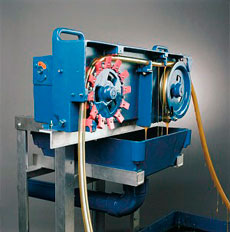
Many types of industrial processes create waste oil, and collecting, storing and disposing of it can be time-consuming and expensive. Worse yet, without constant effort to remove it, residual oil can build up and cause hazards, contamination and machine downtime. In the metals industry, oil waste comes from machinery and components used to make steel and other metals, as well as from cleaning metal billets before rolling operations.
Problem: Bethlehem Steel Corporation and Republic Steel Corporation – both now part of Mittal Steel Company – produce vast amounts of oily wastewater in their daily operations.
The plants needed a way to separate the oil from the wastewater, to meet disposal requirements and maintain the efficiency of their wastewater collection and treatment systems. Additionally, the plants needed an oil removal solution that could be easily and quickly integrated into existing systems without interrupting processes such as billet washing.
Solution: Both plants installed Model 6V Brill® Tube Oil Skimmers from Oil Skimmers, Inc. to separate and remove oil from their wastewater. The Model 6V uses a unique anti-clogging design: A polyurethane tube attracts and collects waste oil as it floats on top of wastewater. Next, the tube passes through a scraper system that removes the oil. The oil then flows by gravity into a containment drum.
These tube skimmers, also known as rope mop skimmers, operates independently and, if needed, can run 24 hours a day, seven days a week. The Model 6V’s internal components are made of high-strength steel and bronze for durability, while external parts are made from abrasive-resistant ceramic. The machine often lasts decades – 30 years or more.
Jim Petrucci, Vice President of Oil Skimmers, Inc., said because the company uses factory-trained representatives, Oil Skimmers can even customize features such as mounting racks, making the Model 6V easy to fit into limited or awkward spaces.
“You aren’t picking out something from a catalog,” he explained. “We have standard equipment, but we can adapt, modify or even design custom oil-water separation solutions from scratch.”
Results:
The Model 6V provides three significant financial benefits to companies:
1. It reduces wastewater treatment costs such as chemicals, hauling charges and treatment system maintenance, and improves system efficiency.
2. It reduces regulatory testing requirements and impact fees for wastewater treatment and discharge.
3. It generates an additional revenue stream because the company can sell the high-quality removed oil to recyclers, who pay an average of 50 cents per gallon.
By installing Model 6V tube oil skimmers, the two steel plants doubled the amount of oil removed from wastewater and even created a new revenue stream by reselling the oil to an oil recycling company.
To ensure the cleanest possible wastewater, we also recommend that the steel plants add SAS® Tank Oil Water Separators from Oil Skimmers, Inc. for a complete oil removal system. When there’s not sufficient time or space for the remaining oil and water to separate naturally, only a quality oil water separator like the SAS® Tank will do.
About Oil Skimmers, Inc.
Oil Skimmers, Inc. has been providing oil removal solutions to a variety of industries around the world since 1967. We continue to grow our capabilities through innovation, new product development, and engineering capabilities to serve the unique challenges that each oily water application presents. For more information about oil skimmers, fully-integrated oil removal systems, oil water separators, and custom-engineering capabilities, email us at info@oilskim.com or call +1 (440) 237- 4600 to speak to one of our applications specialists.